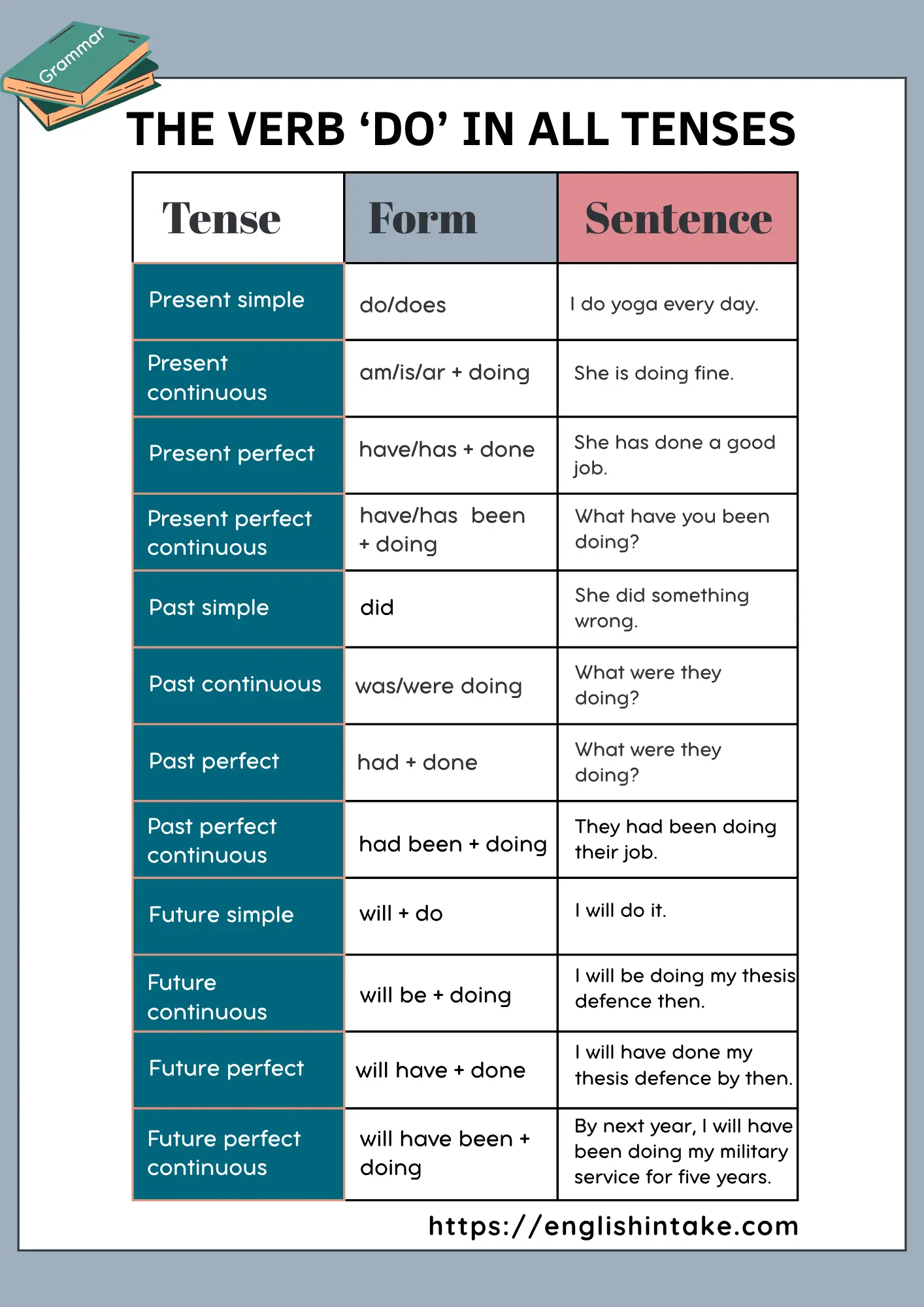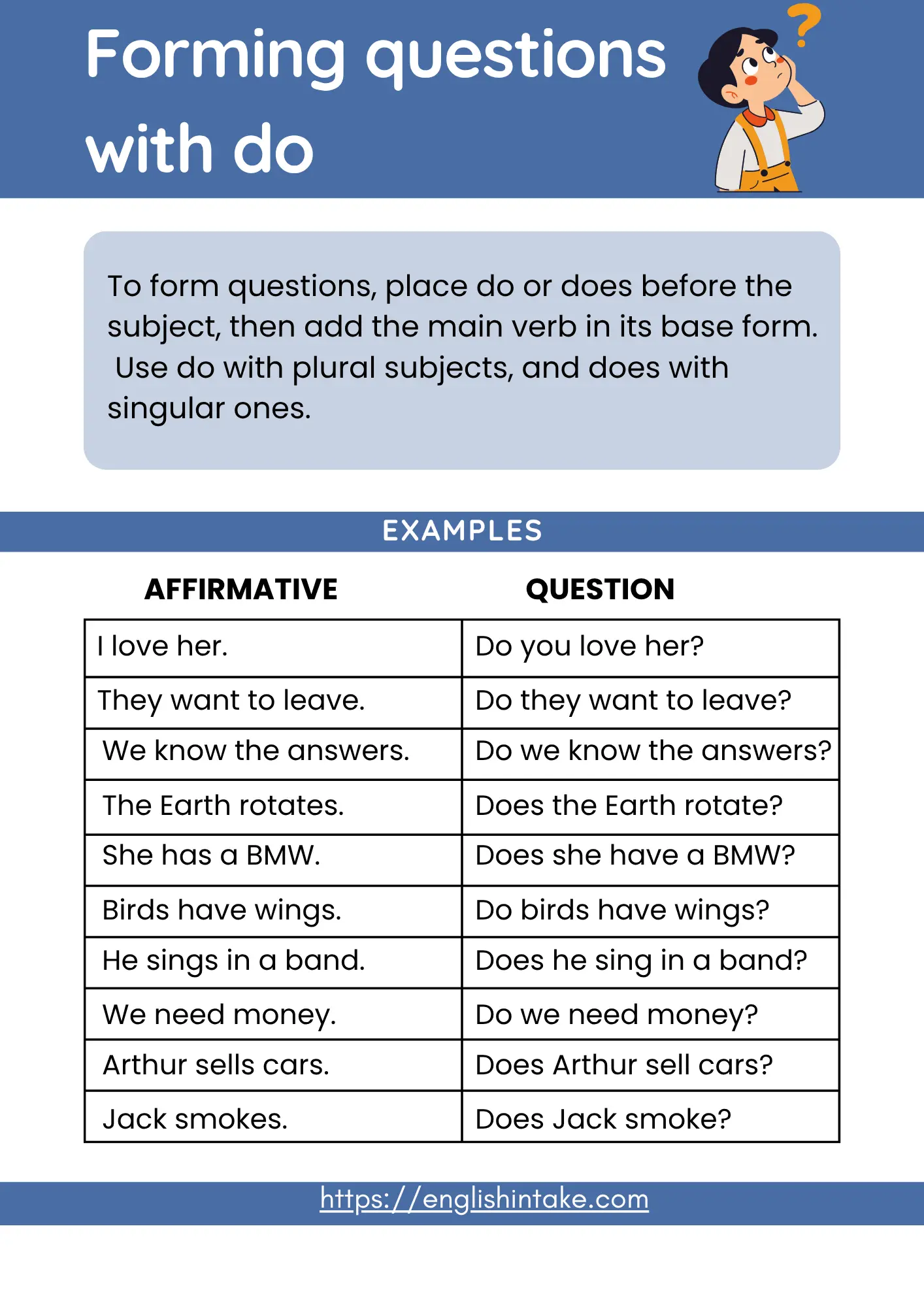1. The English verb 'to do'
The verb to do is one of the three auxiliary verbs in English grammar (be, have, do). It can function as a main verb and as an auxiliary verb. We use it to ask questions (Do you love me?), form negative sentences (I didn’t like the cake. It was too sweet.), and add emphasis in our daily conversation (I do love her so much.).

2. Uses
As a main verb1. I do my homework every evening.
2. They do a lot of exercises to stay fit.
3. She gives her best in everything she does.
As an auxiliary verb1. Do you like chocolate?
2. She doesn’t go to the gym on weekends.
3. I don’t love her anymore.
3. Present simple form
Positive (+)I do
You do
He does
She does
It does
We do
You do
They do
Negative (-)I do not
You do not
He does not
She does not
It does not
We do not
You do not
They do not
- short form (1)I don’t
You don’t
He doesn’t
She doesn't
It doesn’t
We don’t
You don’t
They don’t
InterrogativeDo I?
Do you?
Does he?
Does she?
Does it?
Do we?
Do you?
Do they?
Interrogative (-)Do I not?
Do you not?
Does he not?
Does she not?
Does it not?
Do we not?
Do you not?
Do they not?
? short form (-)Don’t I?
Don’t you?
Doesn’t he?
Doesn’t she?
Doesn’t it?
Don’t we?
Don’t you?
Don’t they?
4. Do as an auxiliary verb
We use the auxiliary verb do to:
1. form negative statements,
2. form questions,
3. emphasise positive statements,
4. make requests or instructions,
5. and make short answers.
4.1 Positive statements
We do not use do in positive statements, except for emphasis.
1. I eat breakfast every day.
2. They play football on weekends.
3. You study hard for exams.
4. We like ice cream.
5. She works in a bank.
6. He has a car.
7. It rains often in this city.
8. My parents want me to become a soldier.
4.2 Making emphasis
We can use do in positive statements to make emphasis.
1. I do eat breakfast every day.
2. They do play football on weekends.
3. You do study hard for exams.
4. We do like ice cream.
5. She does work in a bank.
6. He does have a car.
7. It does rain often in this city.
8. My parents do want me to become a soldier.
4.3 Negative forms
To form negative statements, use the subject followed by do not (or don’t) and the base form of the verb.
1. I don’t eat breakfast every day.
2. They don’t play football on weekends.
3. You don’t study hard for exams.
4. We don’t like ice cream.
5. She doesn’t work in a bank.
6. He doesn’t have a car.
7. It doesn’t rain often in this city.
8. My parents don’t want me to become a soldier.
4.4 Forming questions
To form questions with do, place its conjugated form before the subject, followed by the base form of the verb in the sentence.
1. I like pizza. ⟶ Do you like pizza?
2. She works here. ⟶ Does she work here?
3. They live in London. ⟶ Do they live in London?
4. He plays the guitar. ⟶ Does he play the guitar?
5. We have homework tonight. ⟶ Do we have homework tonight?
6. It often rains here. ⟶ Does it often rain here?
7. I know the answer. ⟶ Do you know the answer?
8. She speaks English. ⟶ Does she speak English?
9. They want to join us. ⟶ Do they want to join us?
10. She needs help. ⟶ Does he need help?

4.5 Answering questions
To answer questions, use the subject, followed by do or does (for positive answers), don’t or doesn’t (for negative answers), and the base form of the verb.
1. Do you like pizza? ⟶ Yes, I do like pizza (Yes, I like pizza).
2. Does she work here? ⟶ No, she doesn’t work here.
3. Do they live in London? ⟶ Yes, they do live in London (or Yes, they live in London).
4. Does he play the guitar? ⟶ No, he doesn’t play the guitar.
5. Do we have homework tonight? ⟶ Yes, we do have homework tonight (Yes, we have homework tonight).
6. Does it rain often here? ⟶ No, it doesn’t rain often here.
7. Do you know the answer? ⟶ Yes, I do know the answer (or Yes, I know the answer).
8. Does she speak English? ⟶ Yes, she does speak English (or Yes, she speaks English).
9. Do they want to join us? ⟶ No, they don’t want to join us.
10. Does he need help? ⟶ Yes, he does need help (or Yes, he needs help).
4.6 Using do for short answers
1. Do you like pizza? ⟶ Yes, I do like.
2. Does she work here? ⟶ No, she doesn’t.
3. Do they live in London? ⟶ Yes, they do.
4. Does he play the guitar? ⟶ No, he doesn’t.
5. Do we have homework tonight? ⟶ Yes, we do.
6. Does it rain often here? ⟶ No, it doesn’t.
7. Do you know the answer? ⟶ Yes, I do.
8. Does she speak English? ⟶ Yes, she does.
9. Do they want to join us? ⟶ No, they don’t.
10. Does he need help? ⟶ Yes, he does.
4.7 Making requests or instructions
We can also use do to make emphasis while making requests or instructions.
1. Please, do lock the door before you leave.
2. Do let me know if you need any help.
3. Do call me when you get home.
4. Do check the mailbox for any new letters.
5. Don’t forget to call me when you get home.
6. Please, do make sure you turn off the lights when you’re not in the room.
